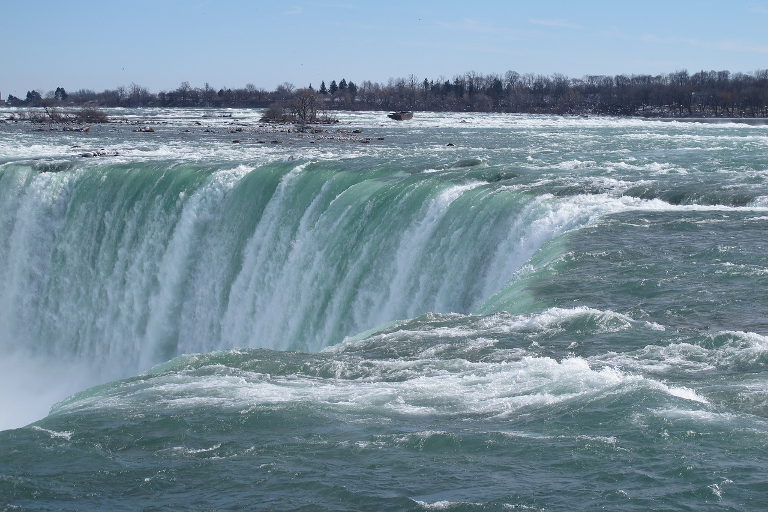How much time do we spend fretting over the course we take as a human species? Granted, perhaps too few are focused on ultimate success, which I define as long-term sustainable living as a subordinate partner to all of life on Planet Earth. Even for those who do concern themselves with the intermediate and far future, attention tends to focus on what adjustments we can make to steer a safer course. Yet, when have we ever truly steered our path as a species? Are we actually in control at all? I’ll argue that we’ve never really been in the driver’s seat on the decisions that have mattered most. Our path has been more like an amusement park ride equipped with an ornamental steering wheel, giving the adorable tykes an intoxicating but illusory sense of control.
The central idea is that any development conferring a short-term competitive advantage will come to dominate the landscape, so that failure to adopt it means losing the race and dropping out of the future. It’s a meta-evolution selecting for something other than our best interests. And it’s winning, as it must.
Before jumping in, I will note that this line of thinking was heavily inspired by a Great Simplification podcast episode featuring Daniel Schmachtenberger. (This relatively new podcast by Nate Hagens has many excellent, thought provoking episodes and an accompanying high-quality animation: I recommend checking it out.)
The idea is simple enough, and has played out over and over and repeatedly and repetitively throughout our history. A tribe that utilized fire could access food (via cooking) that others could not, stay warmer in cold periods, alter landscapes to their benefit, flush out game, and use it as a weapon against competitors. Should a tribe either not develop the skill or opt out of utilizing it, they simply lost the competition and faded. The language Schmachtenberger uses is that superior technology is obligate: its use is obligatory. Eddie Izzard captures the essence of this no-brainer “choice” in the question: Cake or Death?
The same logic applied to agriculture. Those who opted in enjoyed surplus/stored food, increased numbers, freedom to specialize, and could afford to stand up full-time soldiers. Those who didn’t play along—especially if they occupied valued land—were destined to fail. The fact that agriculture emerged independently across the world and came to dominate once the climate became sufficiently stable speaks to the de-facto compulsory nature of the “choice.”
Next we stumbled on Enlightenment (scientific) thinking. The advantage is obvious, in that the underlying principles work every time. Just as a game player who has absorbed all the rules will have a substantial competitive edge over someone who is just winging it, mastering the rules of the actual universe is a winning strategy.
Rather than beat this drum to excess, I’ll lump the next four into one giant roll: fossil fuels, technology, capitalism (a market economy), and democracy (or other political systems, but the pairing of capitalism and democracy has been especially potent for maximizing growth). I know—it’s a lot. All four together have promoted breathtakingly rapid growth of the human endeavor. Never mind that said growth comes at the expense of over-exploitation of the biophysical substrate—likely to the point of its own eventual demise. The selection process operates on the short term. Any society electing not to use these tools self-limits to its own detriment and potential demise.
No Agency
In this light, we can see that we never sat around a table and debated whether to use fire, agriculture, science, fossil fuels, technology, or capitalism. Sure, we had discussions, and may fool ourselves into thinking we were in control—yet another facet of our human exceptionalism. But it wasn’t a true choice, in that those opting out are either gone or not faring well in our current global civilization. So it can seem in hindsight like a series of deliberate moves that put us on the “right” track—where “right” just means “current,” possibly translating to “disastrous.”
Yet, based on the obligate nature of all these branches, we actually had little or no agency in their outcomes. It’s as if floating on a raft on a stream that joins a larger river and asking which way to go at the juncture. All the forces point downstream. A raft deciding to hold steady or struggle upstream risks foundering, while those who “decide” to go downstream can congratulate themselves all they want, but really have nothing to do with how easily the transition was accomplished: it hardly could have succeeded any other way.
Today, markets and financial systems obligate the victors of this world to pursue short term returns, robbing humanity of the opportunity to exercise wisdom or consider the far future. As an illustration, Bret Stephens of the New York Times disappointingly asserted that “Democrats need to figure out a set of climate-change policies that don’t threaten people’s wallets, jobs or businesses.” Those are indeed the elements firmly clutching the steering wheel, navigating a route to failure by naively inverting the hierarchy of artificial systems with respect to biophysical reality—as if proclaiming that nature dare not impose bounds on our ambitions and ideals. Such tantrums demand Immediate “empty calorie” gains that in practice out-compete more rational approaches.
Class 5 Rapids
Continuing the raft metaphor, we can think of the agricultural shift as people stepping onto a raft on a slow, gentle stream. The choice conferred some modest advantage at first, traveling toward resource security more swiftly than would be possible by bushwhacking along the shore. But it was still possible to safely hop back and forth between the shore and raft for a time. Eventually, those who stayed on the raft got ahead of the shore-bound folks. The stream joined another and picked up speed—now undoubtedly superior to travel along the shore. The larger stream, joined by other branches, became a small river. Fast-forward to today, and we find ourselves bumping along on a class-5 rapid. It’s exhilarating, more than a touch dangerous, and unbelievably fast.
Since the acceleration to our current breakneck speed has taken many generations, most perceive this insane condition as being normal, and don’t give much thought to the situation. Yet, we owe it all to an extravagant one-time spree of inheritance spending: a fireworks show, made possible by our fossil fuel suit. Some attempt to better contextualize our situation by casting their gaze upstream toward our history, asking how each “decision” at each confluence led us to this impressive state. Many imagine that the ride only gets more exciting. In a sense, they may be right—in that we likely face a waterfall ahead that is unsurvivable in our primitive raft. Not everyone agrees that there’s a waterfall: we haven’t had one yet (ignoring previous civilization collapses in tributaries to our river). While some look to the past and use this as a basis for extrapolation, most simply look within the raft (consumed by culture, human affairs) or over the immediate edge (hey look: there’s a fish!). The waterfall is not obvious from our low perch in the churning water. But it is not really that hard to see the mist and discern an approaching roar.
Techno-optimists might suggest retrofitting our raft with thrusters so that we can take to the air as we cross the waterfall’s edge. At least that approach acknowledges the waterfall, but let’s be more realistic. A friend suggested that we really need to throw a line to the shore, but lack any rope in our raft. We have to make a rope out of materials on hand. Well, we could use our own hair! This is apt, because getting out of our current situation will involve pain and sacrifice. Are we capable of it? Do we even have time?
Part and Parcel
No metaphor is perfect, and I may be over-using the stream/raft/waterfall construct, but the essential aspect is the inexorable nature of the beast. Once we stepped onto the raft, the path was set. The watercourse does what it does. Powerful forces pushed us into our current configuration. Sure, history could have gone many other ways in the details, but whoever mastered fire, agriculture, technology and fossil fuels was destined to prevail. Picture a sailing ship-of-the-line from the Napoleonic era up against a modern battleship: no number of cannon shots from the wooden ship would risk sinking the battleship, while a single, precise blow from the battleship would knock the primitive craft into splinters—as if swatting a pesky gnat to its instant oblivion.
The fact that fire exists is independent of human existence. Likewise for the concept of agriculture (ants also farm), fossil fuels, etc. Taken to their logical conclusion, these forces become so effective at resource exploitation that ecosystem collapse (the waterfall) is a built-in feature. It’s just what this river does. It was always so, and here we are, finally able to anticipate the consequences.
Nature does not care about our fate. Evolution results in many blind trials. The fact that a self-destructive, yet obligate pathway exists is both fascinating and unfortunate. The “river” does not have our best interests at heart. Fire does not care what its adoption does to us. While wheat enjoys a genetic advantage from having domesticated us (settling us into permanent homes), it cannot know or care where this ultimately leads. Fossil fuels give us superpowers to accelerate our overshoot in spectacular fashion. None of it is about us. The world possesses dangers. Slippery slopes and harrowing waterfalls are a part of the landscape.
After drafting this post, I happened upon Ronald Wright’s A Short History of Progress after first reading it about 15 years ago. Although I did not appreciate or absorb it at the time, I seem to have slowly drifted to a similar conclusion. On page 30, he says:
This [human] experiment has never been tried before. And we, its unwitting authors, have never controlled it. This experiment is now moving very quickly and on a colossal scale. […] We have reached a stage where we must bring the experiment under rational control, and guard against present and potential dangers. It’s entirely up to us. If we fail—if we blow up or degrade the biosphere so it can no longer sustain us—nature will merely shrug and conclude that letting apes run the laboratory was fun for a while but in the end a bad idea.
What’s the Point?
Some may find my perspective about lack of agency and a collapse-scale waterfall ahead to be fatalistic and full of despair. That’s not how I feel. First, I would rather understand the situation than not. Secondly, at some level, it absolves us of responsibility: not so much a matter of us screwing up as just inhabiting a world where this sort of thing is natural or even inevitable.
But I’m not one to acquiesce. Again paralleling Ronald Wright’s sentiment above, I hold that understanding the situation is the first step in crafting a strategy to avoid total failure. Just because we have never effected agency in our route to the present (we never really had to) does not mean that we cannot try to learn something new and finally step up to the challenge. The mere possibility that we are capable of understanding the situation is huge. If we can collectively acknowledge our peril and recognize the need to make radical changes—to fight or ignore the forces that have pushed us onto our current path—then that is a feat worthy of song. Is it at all possible? I don’t know. But I’m energized to do what I might. As I keep telling folks, I am a wild-eyed optimist, deep down. To characterize my message and efforts as pessimistic is too narrow an interpretation: a reflexive rejection/denial of the necessary pretext (the bad-news portion). The overall context is rooted in hope.
Our reaction, then, is where fatalism and despair find purchase. The facts don’t create resignation: we do. We at least have agency in that.
Photo: Courtesy Pixabay/fraugun





